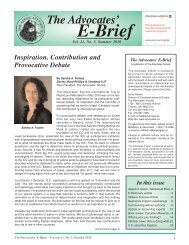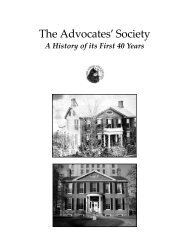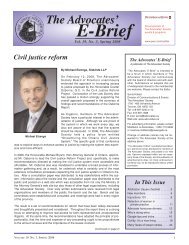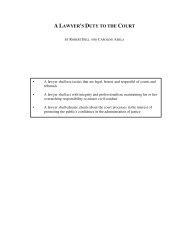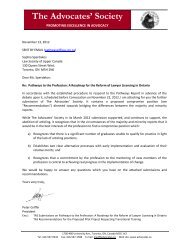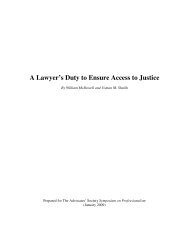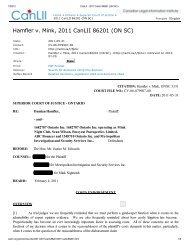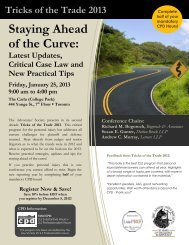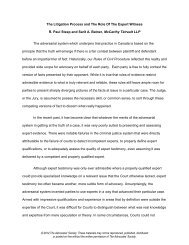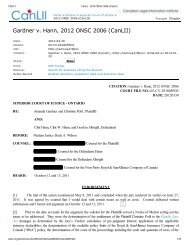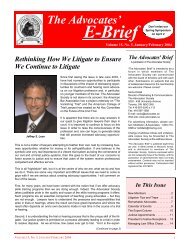(Continued from page 13)the Court. Those principles, listed byBinnie J., concern basic protection forthe rights of the parties, the conduct ofthe search, and procedure following thesearch.<strong>The</strong> Court of Appeal had downplayedthe fact that plaintiffs' counsel onlycame into possession of privileged documentsthrough the execution of anAnton Piller order, describing theprocess as "inadvertent." Justice Binnieaccepted the <strong>Society</strong>'s submission thatthe notion of "inadvertence" was analyticallyunhelpful, because it conflates twoquestions that should be distinct: (a)how did the documents come into thepossession of the plaintiff or its counsel;and (b) what did the plaintiff and itscounsel do upon recognition that thedocuments were potentially subject tosolicitor-client privilege. Undoubtedly,plaintiffs' counsel did not intend toobtain solicitor-client privileged documentsfrom the defendants. But plaintiffs'counsel and the supervising solicitorhad failed to ensure that the order orthe procedure followed in executing theorder sufficiently safeguarded thedefendants' rights.Regarding the appropriate remedy,Justice Binnie accepted the submissionsof the <strong>Society</strong> and the CanadianBar Association that a range of factorsshould be considered. On the facts ofthe appeal, Binnie J. held that theappropriate remedy was disqualificationof plaintiff's counsel.Celanese contains several key elements.First, it confirms that theMacDonald v. Martin Estate test appliesto disqualification motions generally.Second, it establishes that the disqualificationtest in that case is not limited tosolicitor-client relationships -- duties canextend to other parties too, includingopposing parties. Third, it sets out clearprinciples to govern Anton Piller ordersand their execution. Fourth, it confirmsthe extreme and extraordinary nature ofAnton Piller orders. Finally, it confirmsthe high value placed on protectingsolicitor-client privilege.We express our gratitude to CliffordLax, Q.C. and Paul Michell of LaxO’Sullivan Scott LLP, who represented<strong>The</strong> Advocates’ <strong>Society</strong> in itsintervention in the Celanese appeal.14When Real Estate MattersFor more than 30 years, Clayton Research has beenproviding the legal community with independent advice andexpert witness testimony pertaining to:• real estate and land development agreement disputes• property value impacts – environmental or expropriation• development approvals• construction industry• real estate market context and economic analysisWe’re the ExpertsUrban and Real Estate Economists416-699-5645 www.clayton-research.com 1-800-689-4425<strong>The</strong> Advocates’ <strong>Society</strong> Mission Statement<strong>The</strong> Advocates’ <strong>Society</strong> is the professional organization for advocatesin Ontario. As such, our mission is to:• be the voice of advocates in Ontario;• promote ethical and professional practice standards for advocates;• expand our leadership role in teaching the skills of advocacy;• protect the independence of the bar and the judiciary, and• foster collegiality among membersVOLUME 18, NO. 1, SUMMER 2006
<strong>The</strong> Supreme Court of Canada Ruleson Litigation PrivilegeSpotlight On aBoard MemberBy Wendy Matheson and David Outerbridge, Torys LLP 1On <strong>Sept</strong>ember 8, 2006, the Supreme Court of Canada ruled for the first time on thenature and scope of litigation privilege, in Minister of Justice v. Blank. 2 <strong>The</strong><strong>Advocates'</strong> <strong>Society</strong> intervened in the appeal, given the importance of the case to theadministration of justice. <strong>The</strong> central issue was the duration of litigation privilege.Should it be indefinite in duration as is legal advice privilege, 3 or expire when theunderlying litigation comes to an end? Should there be another approach?<strong>The</strong> Blank decision clarifies many areas of the law relating to litigation privilege, andis essential reading for litigation counsel.<strong>The</strong> Court accepted the <strong>Society</strong>'s submission that, while litigation privilege and legaladvice privilege are conceptually and historically distinct, at an overarching level thetwo privileges share a common purpose: they both serve the goal of the effectiveadministration of justice. Litigation privilege does so by ensuring privacy to litigantsagainst their opponents in preparing their cases for trial, while legal advice privilegedoes so by ensuring that individuals have the professional assistance required tointeract effectively with the legal system.<strong>The</strong> Court concluded that the purpose of litigation privilege is to create a "zone ofprivacy" in relation to pending or apprehended litigation.<strong>The</strong> Court further accepted the <strong>Society</strong>'s submission that litigation privilege shouldextend to related litigation. <strong>The</strong> Court held that, while the privilege ends with theunderlying litigation, "litigation" should be understood to encompass more than theparticular proceeding that gave rise to the privilege: As put by Fish J.:As mentioned earlier, however, the privilege may retain its purpose -- and,therefore, its effect -- where the litigation that gave rise to the privilege hasended, but related litigation remains pending or may reasonably be apprehended.In this regard, I agree with Pelletier J.A. regarding "the possibility ofdefining ... litigation more broadly than the particular proceeding which gaverise to the claim" …: see Ed Miller Sales & Rentals Ltd. v. CaterpillarTractor Co. 4At a minimum, it seems to me, this enlarged definition of "litigation" includesseparate proceedings that involve the same or related parties and arise fromthe same or a related cause of action (or "juridical source"). Proceedings thatraise issues common to the initial action and share its essential purposewould in my view qualify as well. 5At the same time, the Court found that litigation privilege may be abrogated where(as was the case in Blank) a party alleges that the opposing party has engaged inan abuse of process or similar "blameworthy conduct." In that type of case, documentsotherwise subject to litigation privilege may be ordered produced upon aprima facie showing of actionable misconduct in relation to the proceedings withrespect to which litigation privilege is claimed. <strong>The</strong> court may review the materials todetermine whether their disclosure should be ordered on this ground.<strong>The</strong> <strong>Society</strong> urged the Court to make it clear that much of a litigation file is coveredby legal advice privilege, and should be protected indefinitely, regardless of whetherlitigation privilege over the file has come to an end. <strong>The</strong> Court endorsed the<strong>Society</strong>'s position, concluding:(Continued on page 16)Peter H. Griffin is a partner in the firmof Lenczner Slaght Royce Smith GriffinLLP. He received his B.A. from CarltonUniversity in 1974, his LL.B. fromQueen's University in 1977, and wascalled to the bar of Ontario in 1980.Peter’s civil litigation practice focuseson commercial disputes, insolvency litigation,securities litigation, audit andaccounting issues and professional liabilitymatters. Peter has been active inteaching advocacy to law students andpractising lawyers through the NationalInstitute of Trial Advocacy programsthrough Osgoode Hall Law School, theUniversity of Toronto Law School, theLaw <strong>Society</strong> of Upper Canada and <strong>The</strong><strong>Advocates'</strong> <strong>Society</strong> in Ontario, and injoint programs of the Department ofJustice / British Columbia Law <strong>Society</strong>in B.C. He also has taken an interest inthe training of advocacy teachersthrough the same programs. He isactively involved in various committeesrelating to the practice of litigation inOntario, and has been active in chairingand teaching at CLE seminars and programs,mostly through the CBA and theLaw <strong>Society</strong>. Peter is a Fellow of theAmerican College of Trial Lawyers.We welcome your comments,articles & announcements.Please forward them to:sonia@advocates.caFax: 416-597-15882020 - 438 University Avenue,Toronto, ON M5G 2K8VOLUME 18, NO. 1, SUMMER 2006 15



